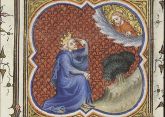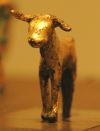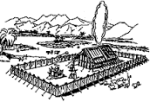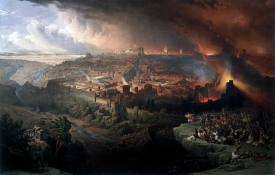(One of a series of posts comparing ideas in the book of Exodus/Shemot with related ideas in the book of Psalms.)

Where does God live?
The “heavens” are the primary residence of many gods, including the God of Israel in the Hebrew Bible. In Canaanite and Babylonian religions, the gods inhabit both the heavens and any number of statues on earth. The God of Israel flatly rejects idols, but still wants a second home on earth. In this week’s Torah portion, Terumah (“Donations”), Moses is receiving instructions from God on top of Mount Sinai. God tells him:
They shall make a holy place for me, veshakhanti among them. Like everything that I show you, the pattern of the mishkan and the pattern of all its furnishings, that is how you shall make it. (Exodus/Shemot 25:8-9)
veshakhanti (וְשָׁכַנְתִּי) = and I will dwell, and I will stay. (A form of the root verb shakhan (שָׁכַן) = stay, settle, dwell, inhabit. This is the first occurrence in the Bible of the verb shakhan.)
mishkan (מִשְׁכָּן) = dwelling-place, home. (Also from the root verb shakhan. This is also the first occurrence in the Bible of the noun mishkan.)

Moses stays on top of Mount Sinai so long—40 days and 40 nights—that in the Torah portion Ki Tissa the Israelites at the foot of the mountain despair of seeing him again. So they make a golden calf in the hope that God will inhabit it.1 God refuses the golden statue and threatens to destroy all the Israelites except Moses and his direct descendants. Moses refuses God’s offer, and God settles for sending a plague.2

After the surviving Israelites have built an elaborate portable tent-sanctuary according to God’s instructions, God descends on it in a pillar of cloud.3 In the book of Leviticus/Vayikra, God speaks to Moses from the empty space above the ark in this mishkan’s innermost chamber.
Throughout the books of Exodus, Leviticus, and Numbers the only mishkan for God is the portable tent-sanctuary. In the first book of Samuel a temple in Shiloh houses the ark, and God speaks to Samuel there.4
King Solomon builds a temple of stone and wood in Jerusalem for God to inhabit. (See my post Terumah & 1 Kings: Tent vs. Temple.) This temple lasts until the Babylonian army razes it in 587 B.C.E., along with most of the city.
Psalm 74 argues that this act was not merely a political conquest by the expanding Babylonian empire, but an attempt to eradicate the worship of God by destroying God’s home on earth. The psalmist, like most prophets writing after the fall of the first temple, probably believed God arranged the fall of Jerusalem in order to punish the Israelites for worshiping idols. Now that the punishment is complete, the psalmist is waiting for God to rescue the deported Israelites (and punish the Babylonians).
Why, God, do You endlessly reject us?
Your anger smokes at the flock You tended.
Remember Your community You acquired long ago!
You redeemed the tribe of your possession.
Mount Zion is where shakhanta. (Psalm 74:1-2)
shakhanta (שָׁכַנְתָּ) = you dwelled, you lived. (Another form of the verb shakhan.)

Siege and Destruction of Jerusalem by the Romans, by David Roberts, 1850
The psalm then describes how the Babylonian army replaced all the emblems of the Israelite religion in the temple with their own emblems, hacked up the carved ornamentation, and burned the wooden parts of the building down to the ground.
They set Your holy place on fire;
They profaned the ground inside the mishkan of Your name. (Psalm 74:7)
Given this disrespect, and given that the Israelites are the people God adopted and brought to Jerusalem in the first place, Psalm 74 asks why God is taking so long to restore God’s own mishkan, city, and people.
Why do you draw back Your right hand,
Holding it in Your bosom? (Psalm 74:11)
The psalm then points out that God created the world and the day and night, then did great deeds without a mishkan on earth. Lack of power is not holding God back. And the Israelites, particularly the poor and needy, belong to God.
Look to the covenant! (Psalm 74:20)
If God would only pay attention, the psalm implies, God would honor Its covenant, restore the Israelites to Jerusalem, and cause a new mishkan to be built there to facilitate worship.
Do not let the miserable turn back disgraced.
Let the poor and the needy praise Your name! (Psalm 74:21)
In Psalm 74, the mishkan of God is also the mishkan of the people. They need their own home, and they need to have a home for God in their midst. Then, instead of suffering miserably, the needy can praise God and rejoice.
*
Many Jews still want a home where we are free to praise God, to practice our own religion without fear or discrimination.
Half of the Jews in the world live in the nation of Israel, founded in 1948 as a homeland where Jews could escape the genocide, as well as less drastic forms of discrimination, inflicted on them in Europe. Yet over the next 69 years, the Jewish and Muslim residents of Israel have been attacked both by neighboring countries and by each other.
Most of the Jews living outside Israel today are American citizens. Discrimination against Jews in the United States has fallen over the past sixty years, and many of us view America as our real home, where we can participate in the life of our country and remain free to practice our own religion. God has many second homes among religious American Jews; every synagogue is a divine mishkan, and each of us can make a mishkan for God to dwell in our own hearts.
Yet in the past year, discrimination against ethnic and religious groups has become more socially acceptable in the United States. Psalm 74 suddenly seems more relevant.
I pray that the divine spirit blooms in all of our hearts. May we quickly reverse this dangerous trend. And may all people, everywhere, find a safe home.
Do not let the miserable turn back disgraced!
—
1 Exodus 32:1-5.
2 Exodus 32:35: Then God struck the people over what they had done with the calf that Aaron made.
3 Exodus 40:33-34: When Moses completed the work, the cloud covered the Tent of Meeting, and the magnificence of God filled the mishkan.
4 1 Samuel 3:1-10.
7 thoughts on “Terumah & Psalm 74: Second Home”